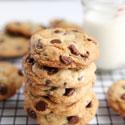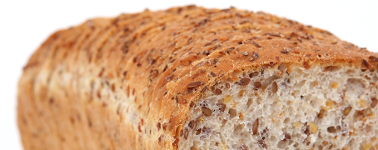Brands
Japanese Soufflé Pancakes Take Instagram – And America – By Storm
.jpg&width=125&height=83) The Japanese soufflé pancake is a fast-growing trend on Instagram: more than 50,000 photos of the fluffy concoctions appear there. Long lines at cafés here and abroad wait to be served the delicacies made with an airy vanilla batter, toasted lightly on each side in a pan, then topped with match custard sauce, boba pearls, fresh berries, or maple syrup and butter. Though their origin is a subject of debate, soufflé pancakes are fluffier and taller – at least two inches high – than American pancakes because they are made from a meringue-based batter using egg yolks mixed with flour, milk and sometimes baking powder, and with egg whites and sugar beaten into a stiff meringue and folded together. The mixture is scooped into ring molds on a frying pan. They end up with a marshmallow-like texture because they’re cooked at a low temperature for a relatively long amount of time.[Image Credit: © nobu sato from Pixabay]
The Japanese soufflé pancake is a fast-growing trend on Instagram: more than 50,000 photos of the fluffy concoctions appear there. Long lines at cafés here and abroad wait to be served the delicacies made with an airy vanilla batter, toasted lightly on each side in a pan, then topped with match custard sauce, boba pearls, fresh berries, or maple syrup and butter. Though their origin is a subject of debate, soufflé pancakes are fluffier and taller – at least two inches high – than American pancakes because they are made from a meringue-based batter using egg yolks mixed with flour, milk and sometimes baking powder, and with egg whites and sugar beaten into a stiff meringue and folded together. The mixture is scooped into ring molds on a frying pan. They end up with a marshmallow-like texture because they’re cooked at a low temperature for a relatively long amount of time.[Image Credit: © nobu sato from Pixabay]
Even Vasectomies Deserve A Special-Occasion Cake
 For small bakers, making cakes for offbeat occasions is a way to increase profits as the market for traditional birthday-wedding-communion-graduation cakes grows stale. One of those offbeat occasions is the vasectomy: about 500,000 are performed in the U.S. each year. Vasectomy cakes topped with scissors, well-placed blueberries, and fondant sperm have become a social media sensation. One such cake caused a buzz on Instagram: the post by Signature Desserts in Nolensville, Tenn., showcased a buttercream-frosted cake with "100% JUICE NO SEEDS HAPPY VASECTOMY!" written on top. The $30 six-inch red velvet cake featured lemons hand-painted on edible paper. Since then, the bakery has gotten requests for hysterectomy cakes.[Image Credit: © Signature Desserts Nate Clingman]
For small bakers, making cakes for offbeat occasions is a way to increase profits as the market for traditional birthday-wedding-communion-graduation cakes grows stale. One of those offbeat occasions is the vasectomy: about 500,000 are performed in the U.S. each year. Vasectomy cakes topped with scissors, well-placed blueberries, and fondant sperm have become a social media sensation. One such cake caused a buzz on Instagram: the post by Signature Desserts in Nolensville, Tenn., showcased a buttercream-frosted cake with "100% JUICE NO SEEDS HAPPY VASECTOMY!" written on top. The $30 six-inch red velvet cake featured lemons hand-painted on edible paper. Since then, the bakery has gotten requests for hysterectomy cakes.[Image Credit: © Signature Desserts Nate Clingman]
Companies
Motivational Speaker Tony Robbins Launches Organic Bakery Inspired By Nuns
 Self-help speaker Tony Robbins has announced the creation of Nunbelievable, Inc., a mission-based, direct-to-consumer premium organic baked goods company whose sales will support the work of soup kitchens and food pantries. Nunbelievable was inspired by the handmade cookies and confectionary creations of the friars and nuns of St. Roger Abbey in association with the Chicago-based religious order Fraternité Notre Dame. The nuns’ San Francisco branch – they also work in Chicago, Detroit, and New York City – was operating a soup kitchen in the Tenderloin District, and was in danger of eviction when Robbins stepped in. covering their expenses for six months and donating $1 million to help them open a new facility. Robbins leads Feeding America's 1 Billion Meals Challenge, which has provided 420 million meals in the past four years and is on track to provide a half-billion meals this year.[Image Credit: © Nunbelievable, Inc]
Self-help speaker Tony Robbins has announced the creation of Nunbelievable, Inc., a mission-based, direct-to-consumer premium organic baked goods company whose sales will support the work of soup kitchens and food pantries. Nunbelievable was inspired by the handmade cookies and confectionary creations of the friars and nuns of St. Roger Abbey in association with the Chicago-based religious order Fraternité Notre Dame. The nuns’ San Francisco branch – they also work in Chicago, Detroit, and New York City – was operating a soup kitchen in the Tenderloin District, and was in danger of eviction when Robbins stepped in. covering their expenses for six months and donating $1 million to help them open a new facility. Robbins leads Feeding America's 1 Billion Meals Challenge, which has provided 420 million meals in the past four years and is on track to provide a half-billion meals this year.[Image Credit: © Nunbelievable, Inc]
Student App Could Be The “Bakery Of The Future”
Restaurant Industry In Mississippi Keeps Shackles On Home Bakers
 Mississippi’s restaurant industry is fighting, successfully so far, attempts to make it easier for home bakers – so-called cottage food operators – to sell their wares online. The state’s lawmakers a few years ago relaxed restrictions on home baking and selling, but left limitations on annual sales ($20,000) and display of images of baked goods on websites and social media. New legislation removing the restrictions passed the House, but died in the Senate, thanks to strong opposition from the Mississippi Restaurant Association, which claimed there was "widespread abuse creating an uneven playing field." Similar battles have been fought in the state, and elsewhere, between established industries and upstarts: food trucks vs. restaurants, small farmers vs. Big Agriculture, Airbnb vs. the hotel industry, Uber vs. taxi companies, etc. “Unfortunately for consumers, too often the response by lawmakers is to agree to protect the established interests rather than letting the market choose the winners and losers.”[Image Credit: © rodolfoguevara55 from Pixabay]
Mississippi’s restaurant industry is fighting, successfully so far, attempts to make it easier for home bakers – so-called cottage food operators – to sell their wares online. The state’s lawmakers a few years ago relaxed restrictions on home baking and selling, but left limitations on annual sales ($20,000) and display of images of baked goods on websites and social media. New legislation removing the restrictions passed the House, but died in the Senate, thanks to strong opposition from the Mississippi Restaurant Association, which claimed there was "widespread abuse creating an uneven playing field." Similar battles have been fought in the state, and elsewhere, between established industries and upstarts: food trucks vs. restaurants, small farmers vs. Big Agriculture, Airbnb vs. the hotel industry, Uber vs. taxi companies, etc. “Unfortunately for consumers, too often the response by lawmakers is to agree to protect the established interests rather than letting the market choose the winners and losers.”[Image Credit: © rodolfoguevara55 from Pixabay]
Barley: Not Just For The Farm Trough Anymore
 A chef in the Pittsburgh area sings the praises of his “favorite grain,” barley – the No. 4 whole grain produced in the world, but the least eaten at the table. Joe Carei acknowledges that barley hasn’t quite made it to the mainstream of home-cooking ingredients – it’s mostly used to feed animals – but home cooks should give it a chance. He suggests, for example, substituting it for side dishes like rice, pasta, and risotto because the healthful grain is inexpensive, filling, a great source of fiber, and easily added to the diet. It can be incorporated into soups, salads or bread. In terms of health, barley can be classified as a superfood: it helps control blood sugar, prevents diabetes, reduces blood pressure and cholesterol, prevents gallstones, and helps with prevention of colon cancer. So “if you are tired of rice or potatoes,” Carei says, “give barley a call. It's waiting.”[Image Credit: © FotoshopTofs from Pixabay]
A chef in the Pittsburgh area sings the praises of his “favorite grain,” barley – the No. 4 whole grain produced in the world, but the least eaten at the table. Joe Carei acknowledges that barley hasn’t quite made it to the mainstream of home-cooking ingredients – it’s mostly used to feed animals – but home cooks should give it a chance. He suggests, for example, substituting it for side dishes like rice, pasta, and risotto because the healthful grain is inexpensive, filling, a great source of fiber, and easily added to the diet. It can be incorporated into soups, salads or bread. In terms of health, barley can be classified as a superfood: it helps control blood sugar, prevents diabetes, reduces blood pressure and cholesterol, prevents gallstones, and helps with prevention of colon cancer. So “if you are tired of rice or potatoes,” Carei says, “give barley a call. It's waiting.”[Image Credit: © FotoshopTofs from Pixabay]
U.S. Pastry Chefs Put Their Personal Stamp On Cookies-And-Milk
 Pastry chefs at restaurants around the U.S. are personalizing an old standby dessert: cookies and milk. A chef at a small plates restaurant in Pittsburgh, for example, serves a selection of 13 cookie creations on a miniature table – a nod to the Ohio/Pennsylvania wedding tradition known as the cookie table – set with four glasses of milk. The cookie selections for the $30 dessert for two-to-four people include, on a rotating basis, lemon poppy swirls; phun-phetti, a cream cheese sugar cookie coated in rainbow jimmies, etc. Southern cuisine restaurant Kitchen Notes in Nashville, Tenn., serves a plate of two cookies – bourbon-soaked oatmeal raisin and caramel pecan chocolate chip – with a carafe of milk for $8. And Washington, D.C. ramen eatery Toki Underground serves a plate of white chocolate and rosemary cookies with matcha milk and matcha buttercream for $7. [Image Credit: © hewq from Pixabay]
Pastry chefs at restaurants around the U.S. are personalizing an old standby dessert: cookies and milk. A chef at a small plates restaurant in Pittsburgh, for example, serves a selection of 13 cookie creations on a miniature table – a nod to the Ohio/Pennsylvania wedding tradition known as the cookie table – set with four glasses of milk. The cookie selections for the $30 dessert for two-to-four people include, on a rotating basis, lemon poppy swirls; phun-phetti, a cream cheese sugar cookie coated in rainbow jimmies, etc. Southern cuisine restaurant Kitchen Notes in Nashville, Tenn., serves a plate of two cookies – bourbon-soaked oatmeal raisin and caramel pecan chocolate chip – with a carafe of milk for $8. And Washington, D.C. ramen eatery Toki Underground serves a plate of white chocolate and rosemary cookies with matcha milk and matcha buttercream for $7. [Image Credit: © hewq from Pixabay]
Aryzta Now Selling Frozen Danish Pastries To U.S. Foodservice Market
Innovations
Slicing A Bagel: When Innovation Sparks A Social Media Controversy
 It seems like a tempest in a teapot. But for some, especially devotees of the traditional bagel – sliced traditionally – it’s something of a typhoon. Social media foodies are engaged in an online battle over the advantages and disadvantages – or the virtues and horrors – of the “bread-sliced” bagel. Bread-sliced means sliced vertically instead of horizontally. The method was announced by someone in St. Louis who said he successfully introduced it to co-workers: “It was a hit!” he tweeted. But not for everyone, apparently. One shocked responder called it “an embarrassment to the whole sliced foods community." A bakery worker tweeted: “I have standards and a healthy respect for bagels." Others, however, lauded the slicing technique for creating a convenience: it’s easy to dip the slices in cream cheese “while walking, driving or typing at your desk.” Another said the bread-slicing "maximize[s] your surface area for spreads." And so the hullabaloo rages on.[Image Credit: © yuri hwang from Pixabay]
It seems like a tempest in a teapot. But for some, especially devotees of the traditional bagel – sliced traditionally – it’s something of a typhoon. Social media foodies are engaged in an online battle over the advantages and disadvantages – or the virtues and horrors – of the “bread-sliced” bagel. Bread-sliced means sliced vertically instead of horizontally. The method was announced by someone in St. Louis who said he successfully introduced it to co-workers: “It was a hit!” he tweeted. But not for everyone, apparently. One shocked responder called it “an embarrassment to the whole sliced foods community." A bakery worker tweeted: “I have standards and a healthy respect for bagels." Others, however, lauded the slicing technique for creating a convenience: it’s easy to dip the slices in cream cheese “while walking, driving or typing at your desk.” Another said the bread-slicing "maximize[s] your surface area for spreads." And so the hullabaloo rages on.[Image Credit: © yuri hwang from Pixabay]
Market News
Paris Baguette Plans Aggressive Expansion Over Next Decade
 The CEO of fast-casual bakery Paris Baquette, founded in South Korea in 1942, has big plans for expansion of the chain in the U.S. Paris Baguette has only 75 locations here, though there are more than 3,000 in France, Korea, Singapore, Vietnam, and China. Jack Moran, a former CEO of international bakery-restaurant chain Le Pain Quotidien, plans to open at least 1,000 U.S. cafés by 2030, with 38 opening this year. That includes a 50 percent increase in company-operated cafés and a 120 percent increase in the number of U.S.-franchised cafés. In addition, Moran will introduce U.S. customers to a more upscale version of Paris Baguette – Maison de PB – which will debut Singapore this year, and in Manhattan in 2020. Why the switch from Le Pain Quotidien to Paris Baguette? "I was knocked out by the quality and breadth of the baked goods selection," Moran said.[Image Credit: © Paris Baguette USA Inc]
The CEO of fast-casual bakery Paris Baquette, founded in South Korea in 1942, has big plans for expansion of the chain in the U.S. Paris Baguette has only 75 locations here, though there are more than 3,000 in France, Korea, Singapore, Vietnam, and China. Jack Moran, a former CEO of international bakery-restaurant chain Le Pain Quotidien, plans to open at least 1,000 U.S. cafés by 2030, with 38 opening this year. That includes a 50 percent increase in company-operated cafés and a 120 percent increase in the number of U.S.-franchised cafés. In addition, Moran will introduce U.S. customers to a more upscale version of Paris Baguette – Maison de PB – which will debut Singapore this year, and in Manhattan in 2020. Why the switch from Le Pain Quotidien to Paris Baguette? "I was knocked out by the quality and breadth of the baked goods selection," Moran said.[Image Credit: © Paris Baguette USA Inc]
Research & Insights
New Technology Takes The Stickiness Out Of Bread Production
 Commercial bread-making machinery typically includes scrapers that constantly push the sticky dough away from the sides of the container. The drawback is that the constant scraping can result in over-kneading and a denser loaf. One answer to the problem could be a more slippery container that requires no scraping and thus produces better-tasting bread. That answer may be on its way, thanks to a team of researchers from MIT that has tackled the problem of how to get much thicker materials to slide without sticking or deforming. The team has developed what are called liquid-impregnated surfaces that are based on a combination of a specially textured surface and a liquid lubricant that coats the surface and remains trapped in place through capillary action. The result? Nearly 100 percent friction reduction for gel-like fluids and sticky pastes.[Image Credit: © Massachusetts Institute of Technology]
Commercial bread-making machinery typically includes scrapers that constantly push the sticky dough away from the sides of the container. The drawback is that the constant scraping can result in over-kneading and a denser loaf. One answer to the problem could be a more slippery container that requires no scraping and thus produces better-tasting bread. That answer may be on its way, thanks to a team of researchers from MIT that has tackled the problem of how to get much thicker materials to slide without sticking or deforming. The team has developed what are called liquid-impregnated surfaces that are based on a combination of a specially textured surface and a liquid lubricant that coats the surface and remains trapped in place through capillary action. The result? Nearly 100 percent friction reduction for gel-like fluids and sticky pastes.[Image Credit: © Massachusetts Institute of Technology]
Baked Goods Ingredient Raises Risk Of Obesity And Diabetes
 A study published in the journal Science Translational Medicine reports that propionate, an ingredient widely used in animal feed, artificial flavorings, and baked goods, may cause a spike in hormones that can raise the risk of diabetes and obesity. Propionate consumption can increase substances in the human body that create excessive insulin and insulin resistance. The researchers observed significant weight gain and a rise in glucose in lab mice, which led to hyperglycemia in the animals. They also tested it in humans, finding that propionate eaters had significant increases in norepinephrine, along with FABP4 and glucagon. These results suggest that propionate could lead to both obesity and diabetes.[Image Credit: © Sornram Srithong from Pixabay]
A study published in the journal Science Translational Medicine reports that propionate, an ingredient widely used in animal feed, artificial flavorings, and baked goods, may cause a spike in hormones that can raise the risk of diabetes and obesity. Propionate consumption can increase substances in the human body that create excessive insulin and insulin resistance. The researchers observed significant weight gain and a rise in glucose in lab mice, which led to hyperglycemia in the animals. They also tested it in humans, finding that propionate eaters had significant increases in norepinephrine, along with FABP4 and glucagon. These results suggest that propionate could lead to both obesity and diabetes.[Image Credit: © Sornram Srithong from Pixabay]
Copyright 2026 Business360, Inc.

